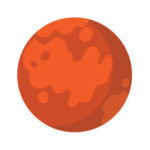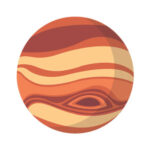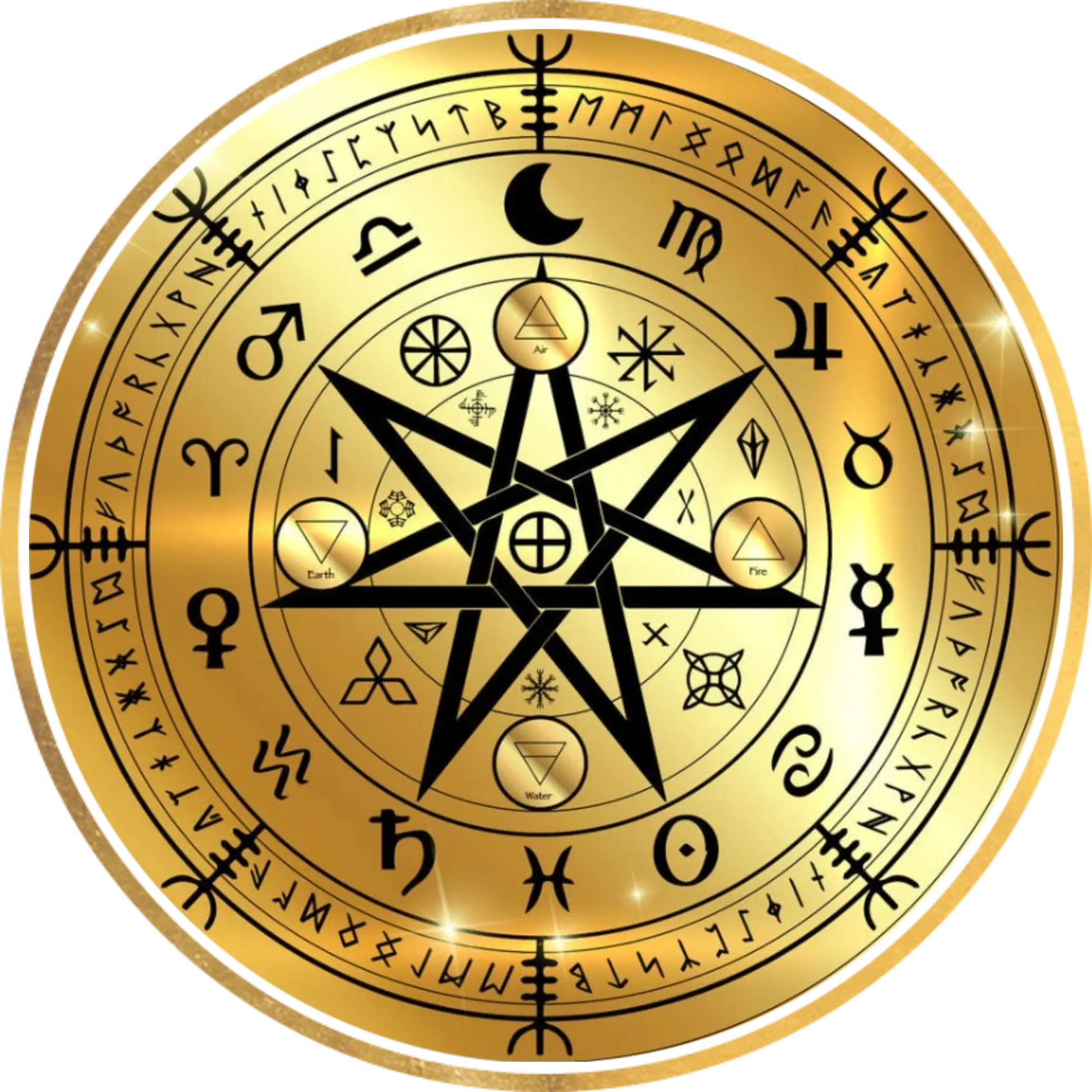In astrology, each planet in our solar system is believed to govern different aspects of our lives, influencing our personalities, behaviors, and experiences. Understanding the planets and their associations can offer profound insights into our own natures and life’s journey.
 Sun (Sol): The Sun represents our core self, ego, and identity. It signifies vitality, leadership, and individuality. In the birth chart, the Sun’s placement indicates our basic nature and primary motivations. In the birth chart the Sun, by sign, house position, and above all the aspects it makes to the chart’s angles and other planets, describes a person’s motivating force; what essentially that person is seeking to become. This is reflected in the Sun’s glyph, a dot, representing potential, in a circle signifying completeness or maturity. On other levels the Sun also corresponds to the masculine principle – willpower, courage, creativity, purpose, growth, one’s sense of uniqueness, authority, the father and the ruler. This last image is particularly helpful to an understanding of the Sun’s astrological function. In life, the ruler is the figurehead under which the disparate social groups of a nation either unite, or divide. Similarly, the Sun symbolises the process by which other planetary energies in the birth chart are integrated, or wasted.м
Sun (Sol): The Sun represents our core self, ego, and identity. It signifies vitality, leadership, and individuality. In the birth chart, the Sun’s placement indicates our basic nature and primary motivations. In the birth chart the Sun, by sign, house position, and above all the aspects it makes to the chart’s angles and other planets, describes a person’s motivating force; what essentially that person is seeking to become. This is reflected in the Sun’s glyph, a dot, representing potential, in a circle signifying completeness or maturity. On other levels the Sun also corresponds to the masculine principle – willpower, courage, creativity, purpose, growth, one’s sense of uniqueness, authority, the father and the ruler. This last image is particularly helpful to an understanding of the Sun’s astrological function. In life, the ruler is the figurehead under which the disparate social groups of a nation either unite, or divide. Similarly, the Sun symbolises the process by which other planetary energies in the birth chart are integrated, or wasted.м
 Moon (Luna): The Moon symbolizes our emotions, instincts, and subconscious mind. It represents our feelings, habits, and responses to the world around us. The Moon’s phase at birth is thought to influence our emotional nature. Just as the Moon reflects the Sun’s light, so in astrology it signifies a person’s instinctive, emotional response to their environment. Where the Sun is connected with action, the Moon’s domain is reaction. These feelings are largely unconscious in childhood, only coming to light as we become aware of our true selves as signified by the Sun. As a result, the Moon by sign, house position and aspects can reveal a great deal about a person’s emotional development as a child, and how these patterns are likely to re-emerge in later life. The Moon also corresponds to the feminine principle, the protective instinct, the home environment, our sense of belonging, natural habits, our eating patterns and preferences, our attitudes to the past, changing moods and fortunes (reflecting the cycles of the Moon), the imagination, the ability to reach the public and women, especially the mother.м
Moon (Luna): The Moon symbolizes our emotions, instincts, and subconscious mind. It represents our feelings, habits, and responses to the world around us. The Moon’s phase at birth is thought to influence our emotional nature. Just as the Moon reflects the Sun’s light, so in astrology it signifies a person’s instinctive, emotional response to their environment. Where the Sun is connected with action, the Moon’s domain is reaction. These feelings are largely unconscious in childhood, only coming to light as we become aware of our true selves as signified by the Sun. As a result, the Moon by sign, house position and aspects can reveal a great deal about a person’s emotional development as a child, and how these patterns are likely to re-emerge in later life. The Moon also corresponds to the feminine principle, the protective instinct, the home environment, our sense of belonging, natural habits, our eating patterns and preferences, our attitudes to the past, changing moods and fortunes (reflecting the cycles of the Moon), the imagination, the ability to reach the public and women, especially the mother.м
 Mercury: Mercury governs communication, intellect, and mental processes. It influences how we think, learn, and express ourselves. Mercury’s placement in the chart can indicate our style of communication and learning preferences. Mercury, in his mythological role as Messenger of the Gods, was responsible for conveying information between mortals and the deities residing on Mount Olympus. In the birth chart, his planetary counterpart fulfils a similar function; Mercury carries the torch of conscious thought to the rest of the chart, offering the opportunity of greater self-awareness along the way. More specifically, Mercury by sign, house position and aspects to other planets reveals the mental frequency on which we operate how we think and generally communicate. He also shows our aptitude for learning, and especially through the contact he makes to other planets, whether our opinions are likely to be based on logic or feelings and habits. In his highest expression, Mercury symbolises the power of wisdom and self-knowledge; in his lowest, the mind of the trickster, full of deceit and low cunning. On other levels Mercury corresponds to the workings of the rational, the objective mind, early school experiences, reading and writing, languages, debate and discussion, transport, commerce, short-distance travel, and the tools of communication – books, newspapers, telephones, television and computers.
Mercury: Mercury governs communication, intellect, and mental processes. It influences how we think, learn, and express ourselves. Mercury’s placement in the chart can indicate our style of communication and learning preferences. Mercury, in his mythological role as Messenger of the Gods, was responsible for conveying information between mortals and the deities residing on Mount Olympus. In the birth chart, his planetary counterpart fulfils a similar function; Mercury carries the torch of conscious thought to the rest of the chart, offering the opportunity of greater self-awareness along the way. More specifically, Mercury by sign, house position and aspects to other planets reveals the mental frequency on which we operate how we think and generally communicate. He also shows our aptitude for learning, and especially through the contact he makes to other planets, whether our opinions are likely to be based on logic or feelings and habits. In his highest expression, Mercury symbolises the power of wisdom and self-knowledge; in his lowest, the mind of the trickster, full of deceit and low cunning. On other levels Mercury corresponds to the workings of the rational, the objective mind, early school experiences, reading and writing, languages, debate and discussion, transport, commerce, short-distance travel, and the tools of communication – books, newspapers, telephones, television and computers.
 Venus: Venus rules love, beauty, and harmony. It governs our relationships, values, and aesthetic tastes. Venus’s placement can indicate our approach to love and what we find attractive or pleasurable. Named after the goddess of love, beauty and sensuality, the planet Venus traditionally refers to our need for relationship, affection and harmony. At a more fundamental level however, Venus is concerned with what attracts and repels us, and how we respond to these influences. The process involved is one of weighing up, of trying to decide what is good or bad according to how we perceive our needs. More often than not, this results in sharing or co-operative behaviour, since most people find dealing with others preferable to being lonely and unpopular. In terms of love, Venus reveals our reaction when we meet it, rather than how we express ourselves emotionally (which is more a function of Mars). Venus rarely gives without expecting something in return, hence our ability to attract harmonious relationships will depend on its sign and house position, and more specifically on the nature of the planets it aspects. On other levels, matters which fall within Venus’ portfolio include the arts, style, taste, physical attraction, close partnerships of all kinds, women and feminine sexuality, physical well-being, money and all means of exchange, diplomacy and vanity.
Venus: Venus rules love, beauty, and harmony. It governs our relationships, values, and aesthetic tastes. Venus’s placement can indicate our approach to love and what we find attractive or pleasurable. Named after the goddess of love, beauty and sensuality, the planet Venus traditionally refers to our need for relationship, affection and harmony. At a more fundamental level however, Venus is concerned with what attracts and repels us, and how we respond to these influences. The process involved is one of weighing up, of trying to decide what is good or bad according to how we perceive our needs. More often than not, this results in sharing or co-operative behaviour, since most people find dealing with others preferable to being lonely and unpopular. In terms of love, Venus reveals our reaction when we meet it, rather than how we express ourselves emotionally (which is more a function of Mars). Venus rarely gives without expecting something in return, hence our ability to attract harmonious relationships will depend on its sign and house position, and more specifically on the nature of the planets it aspects. On other levels, matters which fall within Venus’ portfolio include the arts, style, taste, physical attraction, close partnerships of all kinds, women and feminine sexuality, physical well-being, money and all means of exchange, diplomacy and vanity.
 Mars: Mars is the planet of action, energy, and desire. It represents our drive, ambition, and assertiveness. Mars’s placement can indicate how we pursue our goals and handle conflict. At an instinctive level, Mars represents our determination to battle for survival. When threatened, we can either confront a likely aggressor or flee. As we will only fight for what we value, the implications of Mars in our birth chart have to be seen in conjunction with Venus. While Venus describes what we value, Mars shows how we obtain or preserve it. Consequently, Mars symbolises all those qualities which help us achieve our desires and therefore enhance our self-image, such as initiative, courage, physical strength and stamina. It is through the impulse Mars gives us to assert ourselves that it has acquired its reputation for conflict. In the birth chart, Mars’ sign, house position and aspects show how we arouse ourselves to conscious action and reveals the way we spontaneously express our emotions. On other levels, Mars is associated with athleticism and sport, war and all military affairs, all forms of coercion, men and male sexuality, selfish desires, anger, passion, panic, frustration, guns, iron and all sharp metal instruments, machines and mechanics, technicians, engineers, explosives, fire, fever, inflammation and accidents and operations.
Mars: Mars is the planet of action, energy, and desire. It represents our drive, ambition, and assertiveness. Mars’s placement can indicate how we pursue our goals and handle conflict. At an instinctive level, Mars represents our determination to battle for survival. When threatened, we can either confront a likely aggressor or flee. As we will only fight for what we value, the implications of Mars in our birth chart have to be seen in conjunction with Venus. While Venus describes what we value, Mars shows how we obtain or preserve it. Consequently, Mars symbolises all those qualities which help us achieve our desires and therefore enhance our self-image, such as initiative, courage, physical strength and stamina. It is through the impulse Mars gives us to assert ourselves that it has acquired its reputation for conflict. In the birth chart, Mars’ sign, house position and aspects show how we arouse ourselves to conscious action and reveals the way we spontaneously express our emotions. On other levels, Mars is associated with athleticism and sport, war and all military affairs, all forms of coercion, men and male sexuality, selfish desires, anger, passion, panic, frustration, guns, iron and all sharp metal instruments, machines and mechanics, technicians, engineers, explosives, fire, fever, inflammation and accidents and operations.
 Jupiter: Jupiter is the planet of expansion, growth, and abundance. It signifies luck, optimism, and philosophical beliefs. Jupiter’s placement can indicate where we seek to grow and find meaning in life. As the largest planet in the solar system, it is perhaps not surprising that Jupiter has long been associated astrologically with growth and expansion. This can be taken in the physical sense, in that Jupiter corresponds to the growth of the body – in particular, cellular development and digestion. But the main significance of Jupiter in the birth chart is its function as a social planet, a role it shares with Saturn. The Sun, Moon, Mercury, Venus and Mars all deal with strictly personal aspects of our character without any reference to inherited or environmental factors. Jupiter, by contrast, shows how we grow throughout life to fulfil the potential of our birthright. Growth in this context means how we develop in response to the prevailing beliefs in society, and to what extent we blend in with, or challenge them. In our quest to find a place in the world, Jupiter by sign, house position and aspects it receives shows our social expectations and ideals, and also how we go about creating opportunities to realise them. On other levels, Jupiter corresponds to religious faith, wisdom, our understanding of God, the spirit of the law, philosophy and all theoretical thought. It also embraces, politics, higher education, morality, travel, exploration, anything to do with places abroad, spiritual or material prosperity, over-consumption, obesity and wastefulness.
Jupiter: Jupiter is the planet of expansion, growth, and abundance. It signifies luck, optimism, and philosophical beliefs. Jupiter’s placement can indicate where we seek to grow and find meaning in life. As the largest planet in the solar system, it is perhaps not surprising that Jupiter has long been associated astrologically with growth and expansion. This can be taken in the physical sense, in that Jupiter corresponds to the growth of the body – in particular, cellular development and digestion. But the main significance of Jupiter in the birth chart is its function as a social planet, a role it shares with Saturn. The Sun, Moon, Mercury, Venus and Mars all deal with strictly personal aspects of our character without any reference to inherited or environmental factors. Jupiter, by contrast, shows how we grow throughout life to fulfil the potential of our birthright. Growth in this context means how we develop in response to the prevailing beliefs in society, and to what extent we blend in with, or challenge them. In our quest to find a place in the world, Jupiter by sign, house position and aspects it receives shows our social expectations and ideals, and also how we go about creating opportunities to realise them. On other levels, Jupiter corresponds to religious faith, wisdom, our understanding of God, the spirit of the law, philosophy and all theoretical thought. It also embraces, politics, higher education, morality, travel, exploration, anything to do with places abroad, spiritual or material prosperity, over-consumption, obesity and wastefulness.
 Saturn: Saturn is the planet of discipline, responsibility, and limitation. It represents structure, boundaries, and lessons learned through hardship. Saturn’s placement can indicate where we face challenges and learn important life lessons. In counterbalance to Jupiter’s expansive nature, Saturn’s astrological function is to restrict. This is often a painful but none the less vital part of our development, for Saturn keeps Jupiter’s urge to grow within manageable bounds. Saturn’s position in the birth chart shows where and how we most want to make our mark in society. The aspects it makes to the chart angles and the other planets focus on the obstacles we are likely to meet along the way. These may be self-inflicted or brought about by events which appear to be beyond our control. In both cases, Saturn teaches us, through harsh confrontation with reality and through limiting circumstances, what we must change in ourselves before we can achieve our ambitions. Since few of us accept delays or hardship gracefully, these lessons are seldom learned without pain. At its most constructive, Saturn imparts wisdom born of a true understanding of the virtues of patience, hard work, tradition and self-discipline. But if the Saturnine energy is ignored or becomes too dominant, it may also be repressive – inhibiting our self-confidence and frustrating our aims. Saturn’s rule extends among other things to all rules and regulations, the government and all authority figures, exams and teachers, the physical laws of the universe, economic recession, time, the ageing process, depression, fear and loneliness.
Saturn: Saturn is the planet of discipline, responsibility, and limitation. It represents structure, boundaries, and lessons learned through hardship. Saturn’s placement can indicate where we face challenges and learn important life lessons. In counterbalance to Jupiter’s expansive nature, Saturn’s astrological function is to restrict. This is often a painful but none the less vital part of our development, for Saturn keeps Jupiter’s urge to grow within manageable bounds. Saturn’s position in the birth chart shows where and how we most want to make our mark in society. The aspects it makes to the chart angles and the other planets focus on the obstacles we are likely to meet along the way. These may be self-inflicted or brought about by events which appear to be beyond our control. In both cases, Saturn teaches us, through harsh confrontation with reality and through limiting circumstances, what we must change in ourselves before we can achieve our ambitions. Since few of us accept delays or hardship gracefully, these lessons are seldom learned without pain. At its most constructive, Saturn imparts wisdom born of a true understanding of the virtues of patience, hard work, tradition and self-discipline. But if the Saturnine energy is ignored or becomes too dominant, it may also be repressive – inhibiting our self-confidence and frustrating our aims. Saturn’s rule extends among other things to all rules and regulations, the government and all authority figures, exams and teachers, the physical laws of the universe, economic recession, time, the ageing process, depression, fear and loneliness.
 Uranus: Uranus is the planet of change, innovation, and individuality. It signifies originality, freedom, and rebellion against the norm. Uranus’s placement can indicate where we seek to break free from conventions and create new paths. Uranus has come to symbolise unexpected and traumatic change. Usually this happens when the Saturnine principles of order and control become too rigid, either in either our personal lives or in society as a whole. Some people in life display powerful Uranian drives, either by spearheading progressive reforms, or less constructively by standing out from the crowd through shocking or anti-social behaviour. Whatever the level of expression, Uranian individuals seem to crackle with a mysterious force that generates excitement, eccentricity or danger. For most of us though, the influence of Uranus is not so consistently evident. It tends to take us by surprise when it is activated in our personal lives, for few of us are receptive to the wholesale change it often demands. As a result Uranus is often felt to work disruptively, breaking down attitudes or situations which have become staid and outdated. Yet no matter how painful these rude awakenings may be, they offer us the chance to take control of our destinies and live our lives in accordance with our deepest wishes. In this sense, Uranus can be seen as a truly liberating agent. On other levels it corresponds to electricity, lightning, any sudden illumination or original discovery, eccentricity, all innovative technologies, the abstract sciences, revolutionary ideals, reforms, anarchy, democracy and civil liberties.
Uranus: Uranus is the planet of change, innovation, and individuality. It signifies originality, freedom, and rebellion against the norm. Uranus’s placement can indicate where we seek to break free from conventions and create new paths. Uranus has come to symbolise unexpected and traumatic change. Usually this happens when the Saturnine principles of order and control become too rigid, either in either our personal lives or in society as a whole. Some people in life display powerful Uranian drives, either by spearheading progressive reforms, or less constructively by standing out from the crowd through shocking or anti-social behaviour. Whatever the level of expression, Uranian individuals seem to crackle with a mysterious force that generates excitement, eccentricity or danger. For most of us though, the influence of Uranus is not so consistently evident. It tends to take us by surprise when it is activated in our personal lives, for few of us are receptive to the wholesale change it often demands. As a result Uranus is often felt to work disruptively, breaking down attitudes or situations which have become staid and outdated. Yet no matter how painful these rude awakenings may be, they offer us the chance to take control of our destinies and live our lives in accordance with our deepest wishes. In this sense, Uranus can be seen as a truly liberating agent. On other levels it corresponds to electricity, lightning, any sudden illumination or original discovery, eccentricity, all innovative technologies, the abstract sciences, revolutionary ideals, reforms, anarchy, democracy and civil liberties.
 Neptune: Neptune is the planet of dreams, illusions, and spirituality. It represents our imagination, intuition, and connection to the divine. Neptune’s placement can indicate where we seek transcendence and spiritual fulfillment. As the planet of unreality, of unlimited possibilities and things we cannot touch or see, Neptune’s function is to break down the boundaries that keep us contained within the realities of the physical universe. Both personally, and in society as a whole, the effect is to undermine the limitations imposed by harsh, practical Saturn. Neptune offers us the promise of other realities, and in so doing, fuels our dreams of transcending the routine and the humdrum. In its positive expression, Neptune enables us to shift the focus of our lives from purely selfish concerns to a vision of the “greater whole” of which each of us is a part. It can heighten perception, inspire the imagination and deepen our understanding of other people. The ideals it spawns are both universal and spiritual. The darker side of Neptune emerges when our wishes bear little relation to what we are capable of achieving. If, for whatever reason, we are reluctant to face undesirable qualities in ourselves, then our Neptunian values become distorted. When this happens, Neptune brings confusion, self-deception, greed, deceit, loss, disillusionment and a flight from reality through drugs, alcohol or idle fantasy. Other correspondences to Neptune include water in all its forms, shipping, oil, chemical gases, leaks, scandal, films, photography, mysticism, altruism, martyrdom, spiritual salvation, artistic inspiration, altered states of consciousness, and illusion or confusion.
Neptune: Neptune is the planet of dreams, illusions, and spirituality. It represents our imagination, intuition, and connection to the divine. Neptune’s placement can indicate where we seek transcendence and spiritual fulfillment. As the planet of unreality, of unlimited possibilities and things we cannot touch or see, Neptune’s function is to break down the boundaries that keep us contained within the realities of the physical universe. Both personally, and in society as a whole, the effect is to undermine the limitations imposed by harsh, practical Saturn. Neptune offers us the promise of other realities, and in so doing, fuels our dreams of transcending the routine and the humdrum. In its positive expression, Neptune enables us to shift the focus of our lives from purely selfish concerns to a vision of the “greater whole” of which each of us is a part. It can heighten perception, inspire the imagination and deepen our understanding of other people. The ideals it spawns are both universal and spiritual. The darker side of Neptune emerges when our wishes bear little relation to what we are capable of achieving. If, for whatever reason, we are reluctant to face undesirable qualities in ourselves, then our Neptunian values become distorted. When this happens, Neptune brings confusion, self-deception, greed, deceit, loss, disillusionment and a flight from reality through drugs, alcohol or idle fantasy. Other correspondences to Neptune include water in all its forms, shipping, oil, chemical gases, leaks, scandal, films, photography, mysticism, altruism, martyrdom, spiritual salvation, artistic inspiration, altered states of consciousness, and illusion or confusion.
 Pluto: Pluto is the planet of transformation, power, and regeneration. It signifies destruction and rebirth, bringing deep, lasting changes. Pluto’s placement can indicate where we undergo profound personal transformation. Most astrologers now agree that tiny, distant Pluto represents in the birth chart the process of fundamental transformation – of death and rebirth. In contrast to Uranus, which disrupts the Saturnine structures we create in both society and our personal lives, and Neptune which turns them inside out, Pluto breaks them down completely so that a new level of awareness can be brought into being. Like the other slow-moving planets, the effect of Pluto in any particular sign is to raise issues which are experienced by a generation. In the birth chart, it is Pluto’s house position and the contacts it makes to the chart’s angles and personal planets which show in what area of life we are most likely to respond or contribute to these collective pressures. Pluto’s domain in the birth chart is the subconscious mind, where primitive instincts often lie buried, because we have been taught they are socially undesirable. If we refuse to recognize them, they can result in negative Plutonian patterns of behaviour such as compulsions and obsessions, or give rise to events beyond our control which threaten our very survival. Yet if we can bring these instincts to the surface, Pluto will enable us to refine them so that eventually all aspects of our personality can be brought under conscious control. Such a process of change may be extremely testing, since it involves breaking down old self-images before a new and more complete self is able to emerge. Pluto also governs any aspect of society that is potentially undermining but which we are unwilling to face – the criminal underworld, subversive groups, taboos, urban decay and corruption, earthquakes and volcanic eruptions, self-transforming therapies and healers, charlatans, any form of uncontrolled power, nuclear energy, depth psychology, sexual reproduction, and the orgasm.
Pluto: Pluto is the planet of transformation, power, and regeneration. It signifies destruction and rebirth, bringing deep, lasting changes. Pluto’s placement can indicate where we undergo profound personal transformation. Most astrologers now agree that tiny, distant Pluto represents in the birth chart the process of fundamental transformation – of death and rebirth. In contrast to Uranus, which disrupts the Saturnine structures we create in both society and our personal lives, and Neptune which turns them inside out, Pluto breaks them down completely so that a new level of awareness can be brought into being. Like the other slow-moving planets, the effect of Pluto in any particular sign is to raise issues which are experienced by a generation. In the birth chart, it is Pluto’s house position and the contacts it makes to the chart’s angles and personal planets which show in what area of life we are most likely to respond or contribute to these collective pressures. Pluto’s domain in the birth chart is the subconscious mind, where primitive instincts often lie buried, because we have been taught they are socially undesirable. If we refuse to recognize them, they can result in negative Plutonian patterns of behaviour such as compulsions and obsessions, or give rise to events beyond our control which threaten our very survival. Yet if we can bring these instincts to the surface, Pluto will enable us to refine them so that eventually all aspects of our personality can be brought under conscious control. Such a process of change may be extremely testing, since it involves breaking down old self-images before a new and more complete self is able to emerge. Pluto also governs any aspect of society that is potentially undermining but which we are unwilling to face – the criminal underworld, subversive groups, taboos, urban decay and corruption, earthquakes and volcanic eruptions, self-transforming therapies and healers, charlatans, any form of uncontrolled power, nuclear energy, depth psychology, sexual reproduction, and the orgasm.
 Sun (Sol): The Sun represents our core self, ego, and identity. It signifies vitality, leadership, and individuality. In the birth chart, the Sun’s placement indicates our basic nature and primary motivations. In the birth chart the Sun, by sign, house position, and above all the aspects it makes to the chart’s angles and other planets, describes a person’s motivating force; what essentially that person is seeking to become. This is reflected in the Sun’s glyph, a dot, representing potential, in a circle signifying completeness or maturity. On other levels the Sun also corresponds to the masculine principle –
Sun (Sol): The Sun represents our core self, ego, and identity. It signifies vitality, leadership, and individuality. In the birth chart, the Sun’s placement indicates our basic nature and primary motivations. In the birth chart the Sun, by sign, house position, and above all the aspects it makes to the chart’s angles and other planets, describes a person’s motivating force; what essentially that person is seeking to become. This is reflected in the Sun’s glyph, a dot, representing potential, in a circle signifying completeness or maturity. On other levels the Sun also corresponds to the masculine principle – Moon (Luna): The Moon symbolizes our emotions, instincts, and subconscious mind. It represents our feelings, habits, and responses to the world around us. The Moon’s phase at birth is thought to influence our emotional nature. Just as the Moon reflects the Sun’s light, so in astrology it signifies a person’s instinctive, emotional response to their environment. Where the Sun is connected with action, the Moon’s domain is reaction. These feelings are largely unconscious in childhood, only coming to light as we become aware of our true selves as signified by the Sun. As a result, the Moon by sign, house position and aspects can reveal a great deal about a person’s emotional development as a child, and how these patterns are likely to re-
Moon (Luna): The Moon symbolizes our emotions, instincts, and subconscious mind. It represents our feelings, habits, and responses to the world around us. The Moon’s phase at birth is thought to influence our emotional nature. Just as the Moon reflects the Sun’s light, so in astrology it signifies a person’s instinctive, emotional response to their environment. Where the Sun is connected with action, the Moon’s domain is reaction. These feelings are largely unconscious in childhood, only coming to light as we become aware of our true selves as signified by the Sun. As a result, the Moon by sign, house position and aspects can reveal a great deal about a person’s emotional development as a child, and how these patterns are likely to re- Mercury: Mercury governs communication, intellect, and mental processes. It influences how we think, learn, and express ourselves. Mercury’s placement in the chart can indicate our style of communication and learning preferences. Mercury, in his mythological role as Messenger of the Gods, was responsible for conveying information between mortals and the deities residing on Mount Olympus. In the birth chart, his planetary counterpart fulfils a similar function; Mercury carries the torch of conscious thought to the rest of the chart, offering the opportunity of greater self-
Mercury: Mercury governs communication, intellect, and mental processes. It influences how we think, learn, and express ourselves. Mercury’s placement in the chart can indicate our style of communication and learning preferences. Mercury, in his mythological role as Messenger of the Gods, was responsible for conveying information between mortals and the deities residing on Mount Olympus. In the birth chart, his planetary counterpart fulfils a similar function; Mercury carries the torch of conscious thought to the rest of the chart, offering the opportunity of greater self- Venus: Venus rules love, beauty, and harmony. It governs our relationships, values, and aesthetic tastes. Venus’s placement can indicate our approach to love and what we find attractive or pleasurable. Named after the goddess of love, beauty and sensuality, the planet Venus traditionally refers to our need for relationship, affection and harmony. At a more fundamental level however, Venus is concerned with what attracts and repels us, and how we respond to these influences. The process involved is one of weighing up, of trying to decide what is good or bad according to how we perceive our needs. More often than not, this results in sharing or co-
Venus: Venus rules love, beauty, and harmony. It governs our relationships, values, and aesthetic tastes. Venus’s placement can indicate our approach to love and what we find attractive or pleasurable. Named after the goddess of love, beauty and sensuality, the planet Venus traditionally refers to our need for relationship, affection and harmony. At a more fundamental level however, Venus is concerned with what attracts and repels us, and how we respond to these influences. The process involved is one of weighing up, of trying to decide what is good or bad according to how we perceive our needs. More often than not, this results in sharing or co- Mars: Mars is the planet of action, energy, and desire. It represents our drive, ambition, and assertiveness. Mars’s placement can indicate how we pursue our goals and handle conflict. At an instinctive level, Mars represents our determination to battle for survival. When threatened, we can either confront a likely aggressor or flee. As we will only fight for what we value, the implications of Mars in our birth chart have to be seen in conjunction with Venus. While Venus describes what we value, Mars shows how we obtain or preserve it. Consequently, Mars symbolises all those qualities which help us achieve our desires and therefore enhance our self-
Mars: Mars is the planet of action, energy, and desire. It represents our drive, ambition, and assertiveness. Mars’s placement can indicate how we pursue our goals and handle conflict. At an instinctive level, Mars represents our determination to battle for survival. When threatened, we can either confront a likely aggressor or flee. As we will only fight for what we value, the implications of Mars in our birth chart have to be seen in conjunction with Venus. While Venus describes what we value, Mars shows how we obtain or preserve it. Consequently, Mars symbolises all those qualities which help us achieve our desires and therefore enhance our self- Jupiter: Jupiter is the planet of expansion, growth, and abundance. It signifies luck, optimism, and philosophical beliefs. Jupiter’s placement can indicate where we seek to grow and find meaning in life. As the largest planet in the solar system, it is perhaps not surprising that Jupiter has long been associated astrologically with growth and expansion. This can be taken in the physical sense, in that Jupiter corresponds to the growth of the body –
Jupiter: Jupiter is the planet of expansion, growth, and abundance. It signifies luck, optimism, and philosophical beliefs. Jupiter’s placement can indicate where we seek to grow and find meaning in life. As the largest planet in the solar system, it is perhaps not surprising that Jupiter has long been associated astrologically with growth and expansion. This can be taken in the physical sense, in that Jupiter corresponds to the growth of the body – Saturn: Saturn is the planet of discipline, responsibility, and limitation. It represents structure, boundaries, and lessons learned through hardship. Saturn’s placement can indicate where we face challenges and learn important life lessons. In counterbalance to Jupiter’s expansive nature, Saturn’s astrological function is to restrict. This is often a painful but none the less vital part of our development, for Saturn keeps Jupiter’s urge to grow within manageable bounds. Saturn’s position in the birth chart shows where and how we most want to make our mark in society. The aspects it makes to the chart angles and the other planets focus on the obstacles we are likely to meet along the way. These may be self-
Saturn: Saturn is the planet of discipline, responsibility, and limitation. It represents structure, boundaries, and lessons learned through hardship. Saturn’s placement can indicate where we face challenges and learn important life lessons. In counterbalance to Jupiter’s expansive nature, Saturn’s astrological function is to restrict. This is often a painful but none the less vital part of our development, for Saturn keeps Jupiter’s urge to grow within manageable bounds. Saturn’s position in the birth chart shows where and how we most want to make our mark in society. The aspects it makes to the chart angles and the other planets focus on the obstacles we are likely to meet along the way. These may be self- Uranus: Uranus is the planet of change, innovation, and individuality. It signifies originality, freedom, and rebellion against the norm. Uranus’s placement can indicate where we seek to break free from conventions and create new paths. Uranus has come to symbolise unexpected and traumatic change. Usually this happens when the Saturnine principles of order and control become too rigid, either in either our personal lives or in society as a whole. Some people in life display powerful Uranian drives, either by spearheading progressive reforms, or less constructively by standing out from the crowd through shocking or anti-
Uranus: Uranus is the planet of change, innovation, and individuality. It signifies originality, freedom, and rebellion against the norm. Uranus’s placement can indicate where we seek to break free from conventions and create new paths. Uranus has come to symbolise unexpected and traumatic change. Usually this happens when the Saturnine principles of order and control become too rigid, either in either our personal lives or in society as a whole. Some people in life display powerful Uranian drives, either by spearheading progressive reforms, or less constructively by standing out from the crowd through shocking or anti- Neptune: Neptune is the planet of dreams, illusions, and spirituality. It represents our imagination, intuition, and connection to the divine. Neptune’s placement can indicate where we seek transcendence and spiritual fulfillment. As the planet of unreality, of unlimited possibilities and things we cannot touch or see, Neptune’s function is to break down the boundaries that keep us contained within the realities of the physical universe. Both personally, and in society as a whole, the effect is to undermine the limitations imposed by harsh, practical Saturn. Neptune offers us the promise of other realities, and in so doing, fuels our dreams of transcending the routine and the humdrum. In its positive expression, Neptune enables us to shift the focus of our lives from purely selfish concerns to a vision of the “greater whole” of which each of us is a part. It can heighten perception, inspire the imagination and deepen our understanding of other people. The ideals it spawns are both universal and spiritual. The darker side of Neptune emerges when our wishes bear little relation to what we are capable of achieving. If, for whatever reason, we are reluctant to face undesirable qualities in ourselves, then our Neptunian values become distorted. When this happens, Neptune brings confusion, self-
Neptune: Neptune is the planet of dreams, illusions, and spirituality. It represents our imagination, intuition, and connection to the divine. Neptune’s placement can indicate where we seek transcendence and spiritual fulfillment. As the planet of unreality, of unlimited possibilities and things we cannot touch or see, Neptune’s function is to break down the boundaries that keep us contained within the realities of the physical universe. Both personally, and in society as a whole, the effect is to undermine the limitations imposed by harsh, practical Saturn. Neptune offers us the promise of other realities, and in so doing, fuels our dreams of transcending the routine and the humdrum. In its positive expression, Neptune enables us to shift the focus of our lives from purely selfish concerns to a vision of the “greater whole” of which each of us is a part. It can heighten perception, inspire the imagination and deepen our understanding of other people. The ideals it spawns are both universal and spiritual. The darker side of Neptune emerges when our wishes bear little relation to what we are capable of achieving. If, for whatever reason, we are reluctant to face undesirable qualities in ourselves, then our Neptunian values become distorted. When this happens, Neptune brings confusion, self- Pluto: Pluto is the planet of transformation, power, and regeneration. It signifies destruction and rebirth, bringing deep, lasting changes. Pluto’s placement can indicate where we undergo profound personal transformation. Most astrologers now agree that tiny, distant Pluto represents in the birth chart the process of fundamental transformation –
Pluto: Pluto is the planet of transformation, power, and regeneration. It signifies destruction and rebirth, bringing deep, lasting changes. Pluto’s placement can indicate where we undergo profound personal transformation. Most astrologers now agree that tiny, distant Pluto represents in the birth chart the process of fundamental transformation –